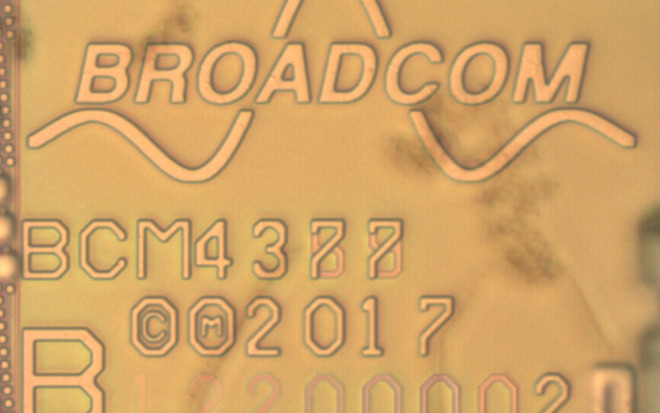Broadcom renews RF chip supply deal with Apple for two more years
Chipmaker Broadcom has confirmed plans to extend its supply deal with Apple for another two years, suggesting that it won't be replaced by first-party wireless chips anytime soon.

A Broadcom Wi-Fi/Bluetooth module in the iPhone XS Max. | Image Credit: Tech Insights
Broadcom will be supplying "specified, radio-frequency [RF] front end components and modules for Apple's smartphones, tablets and watches," the company said in a filing with the U.S. Securities and Exchange Commission. Apple "intends, but is not required" to buy those parts, Broadcom elaborated.
As normal the deal is contingent on Broadcom being able to meet quantity, quality, and delivery standards.
The firm is a long-time Apple partner, with a presence in devices ranging back to early iPhones. Its components include touchscreen controllers, wireless charging units, and most importantly Wi-Fi and Bluetooth modules.
Apple uses firms like Intel and Qualcomm for cellular connectivity. Broadcom was at one point considering acquiring Qualcomm, but was forced to abandon the plan after an executive order by U.S. President Donald Trump on national security grounds.
Apple has already designed W- and H-series wireless chips for the Apple Watch and headphones. Something capable of handling the demands of iPhones, iPads, and Macs may be substantially more complex.

A Broadcom Wi-Fi/Bluetooth module in the iPhone XS Max. | Image Credit: Tech Insights
Broadcom will be supplying "specified, radio-frequency [RF] front end components and modules for Apple's smartphones, tablets and watches," the company said in a filing with the U.S. Securities and Exchange Commission. Apple "intends, but is not required" to buy those parts, Broadcom elaborated.
As normal the deal is contingent on Broadcom being able to meet quantity, quality, and delivery standards.
The firm is a long-time Apple partner, with a presence in devices ranging back to early iPhones. Its components include touchscreen controllers, wireless charging units, and most importantly Wi-Fi and Bluetooth modules.
Apple uses firms like Intel and Qualcomm for cellular connectivity. Broadcom was at one point considering acquiring Qualcomm, but was forced to abandon the plan after an executive order by U.S. President Donald Trump on national security grounds.
Apple has already designed W- and H-series wireless chips for the Apple Watch and headphones. Something capable of handling the demands of iPhones, iPads, and Macs may be substantially more complex.

Comments
IMHO they're certainly far too reliant on a very few specific companies which puts them in a precarious negotiating position and as a result customers may have too much weight in dictating terms. I would not be comfortable at all with having them as a long-term investment.
The W1 chip is over 2.5 years old, Apple can easily produce one, leading me to wonder why they waited. My guess, design for WiFi 6 and carefully plan high bandwidth I/O connections for device processors. This would be essential for low latency communication required by AR glasses.